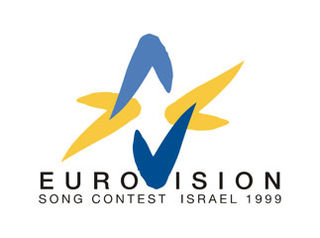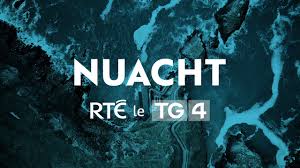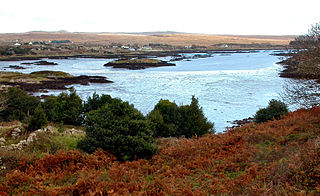
The Eurovision Song Contest 1999 was the 44th edition of the Eurovision Song Contest, held on 29 May 1999 at the International Convention Centre in Jerusalem, Israel. Organised by the European Broadcasting Union (EBU) and host broadcaster Israel Broadcasting Authority (IBA), the contest was held in the country following its victory at the 1998 contest with the song "Diva" by Dana International, and was presented by Dafna Dekel, Yigal Ravid and Sigal Shachmon.
RTÉ Raidió na Gaeltachta, abbreviated RnaG, is an Irish language radio station owned and operated by Raidió Teilifís Éireann (RTÉ). The station is available on FM in Ireland and via satellite and on the Internet. It celebrated 40 years on air on 2 April 2012. In 2022, Raidio na Gaeltachta celebrated its 50th year in broadcasting. The station's main-headquarters are in Casla, County Galway with major studios also in Gaoth Dobhair, County Donegal and Ballydavid, County Kerry.

Ireland has participated in the Eurovision Song Contest 57 times since making its debut at the 1965 contest in Naples, missing only two contests since, in 1983 and 2002. The Irish participant broadcaster in the contest is Raidió Teilifís Éireann (RTÉ). Ireland shares a joint record total of seven wins with Sweden, and is the only country to have won three times consecutively. Ireland has finished second four times, while Sweden has done that just once.

Nuacht RTÉ le TG4 is the main news service for Irish speakers on RTÉ television. The service is broadcast from the news studios at Baile na hAbhann in the Connemara Gaeltacht, County Galway, Ireland.
Croatia participated in the Eurovision Song Contest 1999 with the song "Marija Magdalena" written by Tonči Huljić and Vjekoslava Huljić. The song was performed by Doris Dragović, who had previously represented Yugoslavia in the Eurovision Song Contest in 1986 where she placed eleventh with the song "Željo moja". The Croatian broadcaster Croatian Radiotelevision (HRT) organised the national final Dora '99 to select the Croatian entry for the 1999 contest in Jerusalem, Israel. Twenty-four entries competed in the national final on 7 March 1999 and "Marija Magdalena" performed by Doris Dragović was selected as the winner following the combination of votes from 20 regional juries and a public televote.
Seán Bán Breathnach is an Irish radio and television broadcaster and personality. He broadcasts primarily in the medium of the Irish language.
Ireland participated in the Eurovision Song Contest 2008 with the song "Irelande Douze Pointe" written by Darren Smith, Simon Fine and Dustin the Turkey. The song was performed by children's show puppet Dustin the Turkey. The Irish broadcaster Raidió Teilifís Éireann (RTÉ) organised the national final Eurosong 2008 in order to select the Irish entry for the 2008 contest in Belgrade, Serbia. Six songs faced a public televote, ultimately resulting in the selection of "Irelande Douze Pointe" performed by Dustin the Turkey as the Irish Eurovision entry.
Eimear Quinn represented Ireland in the 1996 Eurovision Song Contest with the song "The Voice".
For the 1997 Eurovision Song Contest held in Dublin, Ireland selected Marc Roberts to represent the country with the song "Mysterious Woman".
Dawn Martin represented Ireland in the 1998 Eurovision Song Contest with the song "Is Always Over Now?".
Ireland participated in the Eurovision Song Contest 2001 with the song "Without Your Love" written by Pat Sheridan. The song was performed by Gary O'Shaughnessy. The Irish broadcaster Raidió Teilifís Éireann (RTÉ) organised the national final Eurosong 2001 in order to select the Irish entry for the 2001 contest in Copenhagen, Denmark. Seven songs faced a regional televote, ultimately resulting in the selection of "Without Your Love" performed by Gary O'Shaughnessy as the Irish Eurovision entry.
Tomás Mac Eoin is an Irish sean-nós singer, actor, songwriter and poet. Also known as Tomás McKeown, he is from An Bóthar Buí in An Cheathrú Rua, Conamara, Galway, Ireland.
Ireland participated in the Eurovision Song Contest 2009 with the song "Et Cetera" written by Niall Mooney, Jonas Gladnikoff, Daniele Moretti and Christina Schilling. The song was performed by Sinéad Mulvey and the band Black Daisy. The Irish broadcaster Raidió Teilifís Éireann (RTÉ) organised the national final Eurosong 2009 in order to select the Irish entry for the 2009 contest in Moscow, Russia. Six songs faced the votes of four regional juries and a public televote, ultimately resulting in the selection of "Et Cetera" performed by Sinéad Mulvey and Black Daisy as the Irish Eurovision entry.
Ireland participated in the Eurovision Song Contest 2010 with the song "It's for You" written by Niall Mooney, Mårten Eriksson, Jonas Gladnikoff and Lina Eriksson. The song was performed by Niamh Kavanagh, who had previously represented Ireland in the Eurovision Song Contest in 1993 where she won the contest with the song "In Your Eyes". The Irish broadcaster Raidió Teilifís Éireann (RTÉ) organised the national final Eurosong 2010 in order to select the Irish entry for the 2010 contest in Oslo, Norway. Five songs faced the votes of six regional juries and a public televote, ultimately resulting in the selection of "It's for You" performed by Niamh Kavanagh as the Irish Eurovision entry.
Rónán Mac Con Iomaire is the Director of Regional & Community Development & Language with Údarás na Gaeltachta and is an Irish author and broadcaster.
Conamara Theas is a predominantly Irish-speaking district in the West of County Galway. There are around 7,000 people living in the area. Between 60% and 80% of residents are native Irish speakers. It is the part of the Gaeltacht that is west of Cois Fharraige. The Conamara Theas variety of Connacht Irish is different from that of Cois Fharraige.

Casla is a Gaeltacht village between Indreabhán (Inverin) and An Cheathrú Rua (Carraroe) in western County Galway, Ireland. The headquarters of RTÉ Raidió na Gaeltachta is located there. The village lies on the R336 road beside Clynagh Bay. Casla means "(twisting) creek" or "inlet from the sea" in Irish.

Brooke Scullion, known professionally as Brooke, is a singer from Northern Ireland. She was a contestant on series 9 of The Voice UK, finishing in third place. She represented Ireland in the Eurovision Song Contest 2022 with the song "That's Rich".

"That's Rich" is a song by Irish singer Brooke Scullion. The song represented Ireland in the Eurovision Song Contest 2022 in Turin, Italy.

An Taobh Tuathail is an Irish language alternative music program broadcast on RTÉ Raidió na Gaeltachta. It has been produced and presented by DJ Cian Ó Cíobháin since its inception in 1999.






